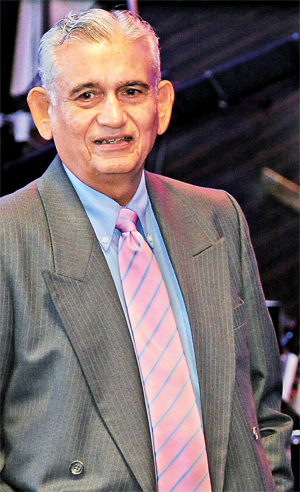England the best; but tie-regulation needs change – Michael Tissera
 A former National Captain, one of the most graceful players at the crease, a good tactician, a Manager, Selector and a member of two Interim Committees. Michael Tissera had done it all. A victory over India by a Ceylon Team in an unofficial test in India was one of the high points of his captaincy. That was a game where both teams devised various stratagems and tactics in order to win.
A former National Captain, one of the most graceful players at the crease, a good tactician, a Manager, Selector and a member of two Interim Committees. Michael Tissera had done it all. A victory over India by a Ceylon Team in an unofficial test in India was one of the high points of his captaincy. That was a game where both teams devised various stratagems and tactics in order to win.
When Tissera speaks, you tend to listen, because of his wide knowledge of the game gleaned from a career of around fifteen years at National Level. The Sunday Times spoke to him at his residence in Nawala and was struck by his frankness and decency.
Sri Lanka’s batting crumbled. He feels that Dimuth Karunaratne, after his success in the South Africa Tests, should have been drafted into the ODI side. His thoughts on Lasith Malinga an indeed interesting. “His very knowledgeable, very aggressive, and wants everyone to be the same. He’s a winner.” Tissera feels that, at times, Malinga got a raw deal.
The former skipper is excited by Sri Lanka’s latest find Avishka Fernando. He also praises Oshada Fernando who missed the cut for the World Cup.
Quite naturally, he speaks at some length on the winners of the World Cup.
“Overall they were the best team. You can’t win every time. They came back well after a couple of defeats. They had all bases covered. Morgan is not the demonstrative type but he got the team behind him”.
Tissera is intensely disappointed by the performance of the West Indies. He knows well the power of the West Indian batsmen and the searing pace of their bowlers, having played against them in the 1975 World Cup and in some other matches.
“Much more was expected of them as they had beaten England earlier. They had around four good batsmen, but they were lethargic on the field”. He stops short of saying Chris Gayle was a passenger on the field.
Even though de Villiers pulled out, South Africa were rated one of the best sides. With the likes of Rabada and Ngidi, they had pace like fire. But with Miller not really delivering “they lacked a solid player in the middle order”.
Pakistan can be a very dangerous side on their day. They had the excellent Babar Azam and the impressive Shaheen Afridi, Pakistan, who had been one of the poorer fielding sides, had improved considerably in the field.
Despite the presence of Adil Rashid, Imran Thahir and the Indian duo, Tissera feels that the WC 2019 was “a tournament where spin did not have an impact.”
He feels that the format for the recent World Cup was a good one. He recalls the 1975 edition “where we played three or four games, and that was it.” Leaving aside three or four matches, there were some close games. This format was used in the 1992 World Cup and forgotten thereafter.
Tissera points out that if you have an off day in an ODI, any side can be beaten. Not a great admirer of the T20 format, he concedes that it has improved bowling, fielding and fitness.
On the six run issue, he thinks that “if an umpire is uncertain in a thing like this, he should be able to go to the third umpire for a correct decision.”
For the future, Tissera suggests that the role of the third umpire, in different situations, should be looked at. He decries the “boundary” solution employed. The winner could be the team that had more points, or the team that had won the earlier match between the teams. The side that lost fewer wickets in their innings (in the event of a tie) could also be declared the winner.


